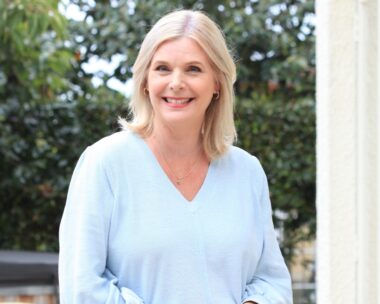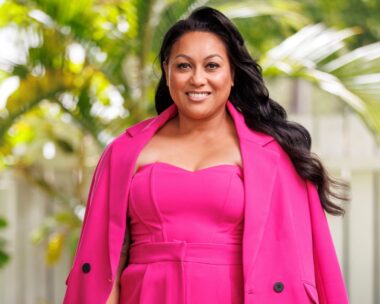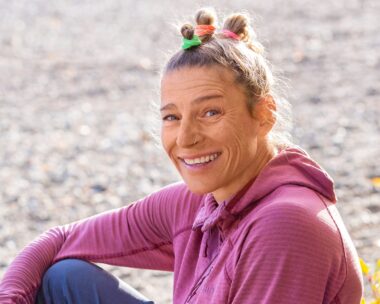The last time Dallas Reedy and Rob Hewitt saw each other, they were just 15. Now they’ve been reunited once more – bonding over their incredible survivals that defied the odds. By rights neither Dallas nor Rob should be alive. Dallas was the sole survivor from the Easy Rider tragedy in Foveaux Strait in which eight people drowned in March this year. He survived for 16 hours in the sea – much longer than the estimated survival time of up to six hours in 13ºC water. Diver Rob survived after four days at sea off the Kapiti Coast, near Wellington. A strong current separated him from his diving buddies and he was left floating in his wet suit. His story made headlines around the world in 2006.
In an amazing coincidence the pair, both 44, were in the same class at school at Te Aute College in Hawke’s Bay and became friends instantly when they met at the age of 13. “We were both country lads,” says Dallas, who was originally from Ruatoria. “We didn’t know anyone and that gave us a common denominator and we gravitated together,” says Rob, who grew up in Waikpukurau. And it was Rob’s story of survival that proved to be an inspiration to Dallas as he fought his own battle six
years later.
“I was aware of Rob’s story and I couldn’t believe my bad luck getting in the same situation,” says Dallas. Rob survived by eating his catch of crayfish and kina and drinking his body fluids through his dive suit. Their school motto “Whakatangata Kia Kaha” (Quit ye like men, be strong) helped to shape both their lives. “Everything we wanted to do was about being strong and surviving,” Rob says. After leaving school, Rob went into the Navy and Dallas into the army. They believe some of the survival skills they were taught also helped them to stay alive.
They also called in favours from their ancestors – especially Dallas. He drew on his great-grandfather who fought in the 28th Maori battalion in World War II. As they neared death, both men prayed to the Maori god of the sea, Tangaroa, and said goodbye to everyone they had met during their lives. “I’d say, ‘Roger! I wish you all the best my friend. Have a good long healthy life,’ and then I’d go on to someone else,” Dallas recalls.
“I went right back to primary school,” Rob explains, “and called out to everyone I could remember in my class.” Rob can remember talking to a bird in Maori, asking it to go and get help to save him. “There’s probably no one else who would understand what it’s like,” says Dallas.

Here, in their own words, both men tell their stories:
**Dallas Reedy’s story:
**“I keep being asked if I believe in fate. And I guess if I hadn’t given a guy my bunk who was feeling seasick, I probably would have drowned myself – that could be fate. The Easy Rider was on a trip to the Muttonbird Islands, near Stewart Island, for the start of muttonbirding season. A rogue wave capsized the vessel, killing eight people. I try not to remember that night, but certain things bring it back – a noise, a smell, an aeroplane, and there are constant reminders in Invercargill. The boat number was 2213 and you see that around a lot.
I’m always bumping into the families of the guys that died – Rewai Karetai (Spud), Paul Fowler-Karetai, David George Fowler, Boe Gillies, Shane Topi, John Henry Karetai, Peter Pekamu-Bloxham and sevenyear- old Odin. Their families are grateful I made it. But I can see it’s tinged with a bit of sadness that they’ve lost their husband, a father, a brother or son. Also, I was the only one on board who wasn’t related to the others or had customary rights allowed on the Muttonbird Islands.
I knew six of the guys, and I’m taking my memories with me – but I refuse to let this be a burden on me. I don’t feel guilty about surviving, but I do feel a responsibility to live my life to the fullest in honour of my fallen comrades. When the rogue wave struck I heard a roar like a jet engine, then I looked up and there was a mass sheet of water, about nine metres high. It was cold and black – like ink.
At first I thought, ‘Here it is, I’m going to die right now.’ Then I thought ‘no’, and I managed to grab a rope, swing around and jump on the keel. For two hours I was banging on the hull, but I had a fair idea no one else had made it. When the boat tipped up and I heard the air coming out of the boat, I felt like it was the life air of everyone on board.
As the boat sank I swam away thinking, ‘This is really it – I’m going to die,’ but then a petrol can popped up – nothing else – and I was able to cling to that for the next 16 hours, desperate to survive for the sake of my wife and three sons. I called it Wilson after Tom Hanks’ volleyball in Castaway. I still have it at home. When I thought I was on the brink of death I tied the petrol can around my neck because I wanted them to know that I had died from hyperthermia and not drowning – I wanted to choose the way I died.
I’ve since found out that the Easy Rider had sunk before on the West Coast bar – they refloated it and it was brought down to Bluff. Life will never be the same. I’ve been unemployed since it happened. No one will hire me at the moment – fishermen are a superstitious bunch and I’ve just come off a boat that’s sunk. But I do want to stay in Invercargill – this is my home. At least I’ve been given the opportunity to go to Iceland to work at the freezing works in September, through my previous job. I’m not scared of the sea – I never have been. But fear can be good, because it keeps you on your toes.”
**Rob Hewitt’s story:
**“I was on a short fishing dive off the Kapiti Coast when I was caught in an underwater current and carried 27 kilometres out to sea. It was 75 hours before I was rescued. For years I kept asking, ‘Why? Why did I survive? Was it because I was destined to save the life of a pedestrian about to be killed by a car, and after that my time would be up?’
Then I realised it’s not about other people, it was about how I can touch and inspire them. At first I didn’t think I had anything to say, but as time went on I discovered I could actually help people. Now when I hear ‘If Rob can do it, I can do it’ – like what Dallas is saying, I know there must have been a reason. I’ve written my book, Treading Water, and been in two documentaries. Now I’m working with New Zealand Post and Water Safety New Zealand on an awareness programme for youth to reduce drownings.
Clinging to hope that I would be rescued helped me to stay alive. It wasn’t about surviving 75 hours. It was about surviving for the next four. Whenever I saw a plane in the sky I would use my dive mask to catch the sun, praying that a passenger looking down might see it. But as time went on it was harder and harder to hang on to hope. But I was desperate to survive because I thought if I don’t, then no one would know how long I managed to live for.
After two days I was apologising to anyone I might have hurt and asking their forgiveness. And I promised to try to be a better person. But after four days out at sea I knew I wasn’t going to survive another night, and I actually wanted to take my own life. I was suffering intense pain from skin infections and sea lice were attaching themselves to my face. I took off my wet suit and waited to die from hyperthermia but then I was spotted by two of my navy buddies who were searching for me. I had been suffering from so many hallucinations I hardly knew where I was when I was pulled from the water.
Six months afterwards, my wife Rangiwhiua got pregnant – she couldn’t get pregnant before that because she had endometriosis. We had one daughter and I have had two older children from a previous relationship. Now I have another daughter, Kiriana, she’s five. I know I’ve been given a second chance, and six years later I’ve been able to get rid of all my questions and just live for the now, and for what you can do in the future.”





